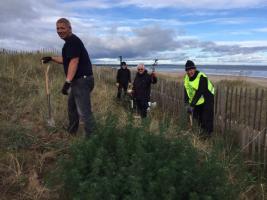Ken Dyke speaking on Submarines - from operation to dismantle
Tue, Sep 14th 2021 at 7:00 pm - 9:00 pm
Host - Wilda McKinnon,
Reception - Kyffin Roberts
Club members please log in for more information.
Ken Dyke, the Director of Nuclear Operationsfor Babcock International at their Rosyth facility gave a most interesting talk. At the Rosyth facility, Babcock have major responsibility for the safe dismantling of retired nuclear submarines, in addition to building new naval vessels for the Royal Navy, Ken spent most of his working life as a marine engineer with the Royal Navy. He had responsibility for the safe operation and maintenance of the nuclear reactor and associated ship services in HMS Victorious (a Vanguard class submarine used in the UK's nuclear deterrent ) since it went into service in 1993.
Before joining Babcock, Ken also had a key role
in regard to the
testing of submarine reactors at the Vulcan Naval
Reactor Test
Establishment, near Dounreay. After many years
ensuring the safe operation
of the navy's nuclear submarine fleet, Ken's
current role is to ensure that
as nuclear submarines reach the end of their
service, they are safely, and
environmentally responsibly dismantled, and
particularly that the
intermediate and low level nuclear waste is
removed and appropriately
managed. Ken
explained that whereas UK at one time, and other countries
still do, simply store such old submarines in a
safe, contained facility, it
is now UK policy to dismantle the submarines and
safely process, recycle or
store any hazardous waste. In such a policy,
Babcock is a world leader in nuclear submarine dismantling. In Ken's explanation of his role and these processes, he made clear that Rosyth has no responsibility for removing the high level residual nuclear fuel; this is done at Sellafield. At Rosyth, Ken has responsibility for the work in removing the old reactor, the steam generating, power plants and associated equipment in processes to identify, extract and manage the different types of waste, nuclear and non-nuclear. In total such waste totals no more than 5% of the total submarine being dismantled. Ken in describing these dismantling processes, explained the tight regulation and overseeing by various agencies to assure the safety of working staff, local community and environment.
A current UK objective is to develop and commission, for the ultimate long-term storage of the more hazardous materials, a geologically stable storage facility; such a site has not yet been decided by UK government. In this talk, perhaps what most came across to members was how lengthy a process is the submarine dismantling involved, being likely to take 8-10 years for any one submarine and currently 27 are waiting to be completed.
In a number of questions from members, Ken described the importance and size of the Babcock operations at Rosyth for the Ministry of Defence, with the submarine dismantling programme involving about 10% of total workforce. Wilda McKinnon gave the vote of thanks on behalf of the members. President Mike Dow then led on club business where it was agreed to defer for another month a decision on returning to face to face meetings.
'What We Do' Main Pages:
